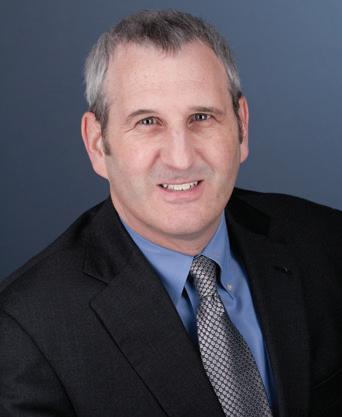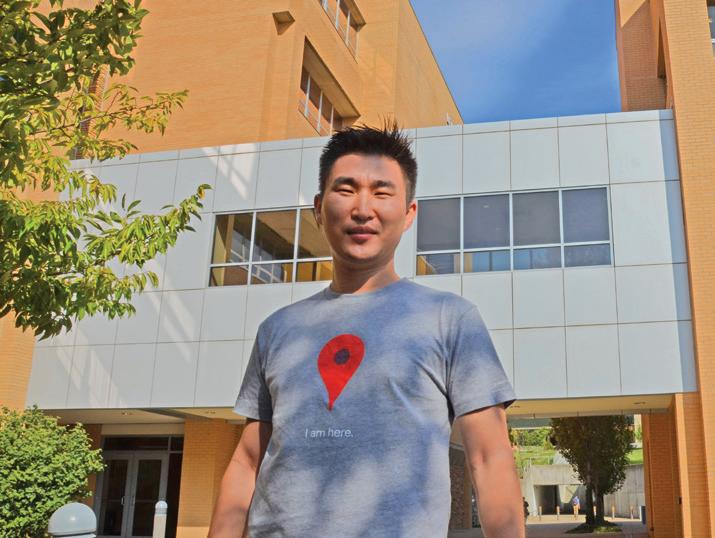
7 minute read
New Technology Could ‘Transform
New Technology Could ‘Transform’ Hydraulic Fracturing, Make Unconventional Reservoirs Development More Efficient
by Brendan Lynch
Advertisement
Hydraulic fracturing, popularly known as “fracking,” has brought about a new era of energy abundance in the United States, slowing American dependence on foreign oil and creating domestic jobs.
KU researchers earned a $3.5 million grant in 2019 from the Department of Energy’s Office of Fossil Energy in partnership with the Houston-based E&P company EOG Resources and in collaboration with the University of California-Los Angeles to develop a new Smart MicroChip Proppants technology that could make unconventional reservoir development by hydraulic fracturing more efficient for energy producers.
When water is forced into shale rock to produce networks of cracks for extraction of oil and gas, those cracks are held open with sand or other materials, called “proppants.” Masoud Kalantari, KU assistant professor of chemical and petroleum engineering and director of the Computational Earth Science and Smart Analytics Lab, aims to develop “smart microchip proppants,” or sandgrain-sized microchips to be injected into unconventional reservoirs with traditional proppants to give well operators unprecedented precision in visualizing fracture networks in real-time.
“The impact would be transformational,” Kalantari said. “During the past 10 years or so, since the shale boom started in the United States, companies have drilled thousands of unconventional horizontal wells in unconventional reservoirs. Technically, when we frack, we’re pumping water mixed with sand called ‘proppants’ to keep those fractures open—but we don’t know exactly the geometry and extent of those fractures. This project offers an innovative and breakthrough technology for improved subsurface fracture characterization, visualization and diagnostics of unconventional reservoirs.”
Kalantari said he envisioned a “closedloop fracture diagnostic and modeling architecture for enhancing fracture design and optimizing well spacing.”
“The innovative element of this battery-less sensor technology includes real-time, cost-efficient, high-resolution and ‘direct’ fracture mapping with varying microchip sizes that match different proppants sizes—as small as 100 mesh size,” Kalantari said.
Kalantari will perform work under the new DOE grant with co-principal investigator Shahin Negahban, KU associate professor of chemical and petroleum engineering.
Kalantari developed the grant proposal in response to a DOE Advanced Technologies for Recovery of Unconventional Oil & Gas Resources funding announcement. He said it represents the largest grant to KU as a lead institution from the Office of Fossil Energy since 2010.
“This has a huge impact on KU’s reputation when we get such a big project,” he said. “It’s going to be a platform for us to go for the next funding opportunity, and we can ask for more for the next project. This is a game-changing project, elevating our prominence.”
Additionally, the new grant will provide for jobs, research opportunities and training for doctoral students and researchers under Kalantari’s supervision.
“This project is part experimental, modeling and also part field execution, so full-time Ph.D. students and researchers will, of course, get practical training and have the chance to work on a novel project that’s not only interest of Department of Energy, but is of interest to almost all major and midsized energy companies in the U.S.,” Kalantari said
Masoud Kalantari
KU Engineering’s Diversity and Women’s Programs Earn National Acclaim
by Joel Mathis
Efforts to attract and retain an increasingly diverse student population have earned national recognition for the KU School of Engineering.
The American Society for Engineering Education (ASEE) announced in 2019 that KU is one of 74 institutions across the country to receive a bronze rating as one of the “nation’s leaders in inclusive excellence.” This is ASEE’s first time rating schools through its Diversity Recognition Program.
“For the three years I’ve been here and the team we have, it means our work is paying off,” said Andrew Williams, associate dean for diversity, equity and inclusion in the School of Engineering. “The support we receive from the dean, our alumni, donors and industry supporters is really starting to show positive results, so we’re happy about that.”
Schools were chosen for bronze status—the highest available classification during the review period—based on their ability to “make significant, measurable progress in increasing the diversity, inclusion, and degree attainment outcomes of their programs,” according to ASEE. KU was one of 28 schools to also receive “exemplar” status, which allows it to seek a silver rating during the next round of reviews.
“It is an honor for KU to receive such high-profile recognition in this inaugural round. We also realize that in order to receive the next level awards, we have more work to do and that all of our faculty, staff and alumni will have to grow and be involved,” Williams said.
Other schools that received “exemplar” status included Duke University, Texas A&M University, the University of Southern California, the University of Maryland-College Park, the University of California-Berkeley and Georgia Tech.
“If you look at some of the institutions that are highly recognized in academics, institutions that are known for their outreach efforts, that’s really rewarding to be on the list,” Williams said. “We are recognized for going above and beyond maybe what some others are doing.”
Williams, who arrived at KU in Fall 2017, said the school’s undergraduate enrollment of women and underrepresented minorities had grown by 5.9% and 4.1%, respectively, from 2017 to 2019. The number of minority students seeking a graduate degree in engineering rose from 32 to 40 during the same time.
“From a numbers perspective,” Williams said, “it seems like our efforts are making an impact.”
Williams and his team have overhauled the school’s diversity programs since his arrival at KU. They started with rebranding those programs under a single umbrella, IHAWKe, which stands for Indigenous, Hispanic, African-American and Women KU Engineering.
Since then, IHAWKe has worked to retain current students through mentoring and tutoring programs, begun outreach to low-income and minority students in middle school

and high school through its KUEST program, created summer acclimation opportunities for new students before they start class, organized hackathons to given students hands-on experience with engineering projects and worked to connect existing undergraduate students to summertime research opportunities. IHAWKe has also brought in guest lecturers and created a visiting scholar program that gives students more exposure to top minds in the engineering field.
“We have found that we are impacting the lives of students that did not see themselves as engineers or students at KU,” Williams said in a blog post announcing the ASEE recognition.
IHAWKe is the latest iteration of diversity efforts in the School of Engineering. In 1971, the school established the Student Council for Recruiting, Motivating and Educating Black Engineers, SCoRMEBE. Over the years, those efforts grew to include other minority student organizations under the Office of Diversity and Women’s Programs. IHAWKe’s constituent groups include the American Indian Science & Engineering Society, the Society of Hispanic Professional Engineers, the National Society of Black Engineers and the Society of Women Engineers.
by Michelle Tevis
The KU School of Engineering named its first group of undergraduates to the Multicultural Scholars Program in summer 2019.
Twelve students were named to the program, which includes a $1,000 scholarship and expanded opportunities to network with other diverse students on the KU campus. KU has supported its Multicultural Scholars Program (MSP) for more than 25 years—the School of Engineering joined the initiative in 2019 from IHAWKe, the school’s diversity outreach program.
“What’s nice about this program is that the students will get a lot of the benefits of what we do in IHAWKe, but they’ll build relationships with multicultural students across campus,” said Andrew Williams, associate dean for diversity, equity and inclusion in the School of Engineering.
Williams and Angela Sublett Knight, program coordinator for MSP, IHAWKe and diversity and women’s programs, will serve as co-directors of the Multicultural Scholars Program.
The inaugural group of Multicultural Engineering Scholars were transfer Luis Belmontes, Kayla Castillo, Darene Essa, Matheson A. Heras, Erika Ibarra, Nia Jackson, Leslie Laguna, Gita Regmi, Ty’Quarius Robinson, Erin Sturd, Gyasi S. Talib and Ngan Tran.
The Multicultural Scholars Program at KU supports the recruitment, retention, academic success and career preparation of underrepresented, Pell IHAWKe
Indigenous | Hispanic | African-American | Women | KU | engineering
Grant-eligible and first-generation undergraduate students. The program exists under the direction of the Provost Office for Diversity & Equity. The program connects students to a small community of others within their respective academic units and to a broader group of students and former students across disciplines that, collectively, provide an active and coherent social and professional network.
The program is open to undergraduate students who are U.S. citizens or permanent residents, and who are part of underrepresented racial and ethnic minority groups, are firstgeneration college students, or who have high financial need as defined by Pell Grant eligibility.
“We’re excited,” Williams said. “It’s another great example of the School of Engineering, the dean and the provost’s office doing something new to help these engineering students that are in these minoritized populations.”










